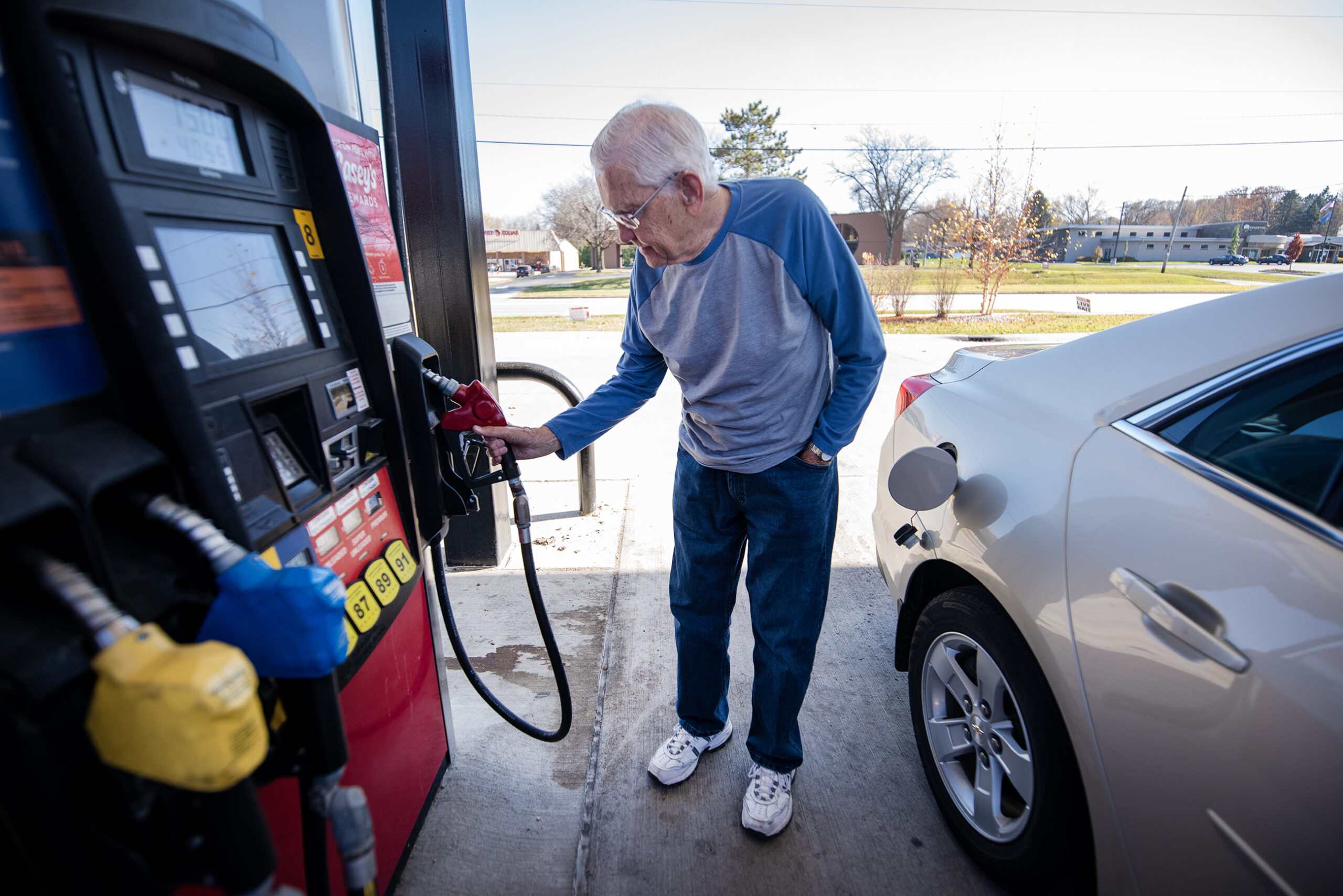Wisconsin gas prices have fallen below $3 per gallon, but diesel prices remain higher than they were a year ago.
According to figures from AAA, the average cost of regular gasoline has fallen from $3.65 last month to $2.85 this month, while the average cost of diesel has declined from $5.13 to $4.28. Gas prices today are lower than their $3.03 average this time last year, but the price of diesel is about 90 cents per gallon higher than it was last December when the average was $3.39.
Nick Jarmusz, director of public affairs for AAA, said demand for regular gasoline typically falls in the winter months, thus lowering prices. But the same can’t be said for diesel.
Stay informed on the latest news
Sign up for WPR’s email newsletter.
“Diesel tends to be less susceptible to seasonal patterns, just because shipping is a year-round industry,” he said. “These sorts of commercial activities that rely on diesel tend to not go down in the wintertime the way we see road trips and leisure driving is reduced in the wintertime.”
Patrick De Haan, an analyst for the website GasBuddy, said Russia’s war in Ukraine is also a driving factor behind elevated diesel prices.
“Russia produces a lot of heavy oil and heavy oil produces more diesel,” he said.
Because many gas stations bought diesel when it was at a higher price, they may be more reluctant to lower prices until they sell much of that fuel, De Haan said.
“It’s going to take stations a little bit longer to start lowering prices because they want to sell through the fuel that they might have bought for $4.50 or $5 a gallon,” he said. “And if they’re not selling through it, they don’t really want to lower the price.”
While the U.S. president often receives credit for low gas prices and blame for high prices, Jarmusz said the factors that determine fuel costs are too complex to blame on one politician or policy.
“It’s typically some combination of factors that is not going to be able to be directly attributed to any one particular policy,” he said. “Focusing the majority of the blame or credit on any politician or any public policy decision is typically going to be missing a lot of context.”
Whatever factors are driving that price, diesel costs have a direct impact on the trucking industry. Patrick Caine works for his family’s trucking company, which is headquartered near Beaver Dam.
Caine said the cost of diesel has been a challenge that forced the company to raise costs for customers.
“With a higher cost on fuel, we have to pass that on,” he said. “We’ll give that customer a rate, but then we also add fuel to that.”
Those elevated costs eventually make their way to consumers, Caine said.
While the cost of fuel impacts consumer prices, De Haan said shipping costs are not the main driver of inflation people are dealing with at grocery stores.
Russia’s war in Ukraine is one of the main reasons the cost of food has increased because Ukraine is a major producer of wheat and corn, he said.
“Agriculture prices are up because of Russia’s war in Ukraine,” De Haan said. “So when does this inflation go away? Well, maybe when Russia exits Ukraine and maybe when Ukraine can start growing more crops again.”
Although diesel prices remain high, De Haan said Wisconsin has seen the nation’s second-largest decline in per gallon prices over the last month.
“At that pace, it probably won’t take till the end of the year to see it go under $4,” he said. “Wisconsin prices move very quickly, or at least they have been falling very quickly.”
For regular gasoline, De Haan said Wisconsin saw the country’s fourth-largest drop in gas prices.
He said the rapid pace of Wisconsin’s falling fuel prices could be a result of the state’s Unfair Sales Act, which prohibits selling items of merchandise below cost.
“Gas stations know that they are going to make a profit, that they have a margin on fuel and that, by law, they have to make money on gasoline,” De Haan said. “That gives them a little bit more certainty to lower prices quicker.”
Wisconsin Public Radio, © Copyright 2024, Board of Regents of the University of Wisconsin System and Wisconsin Educational Communications Board.





